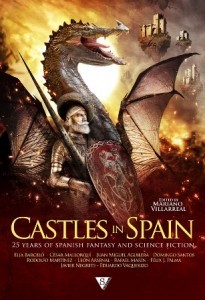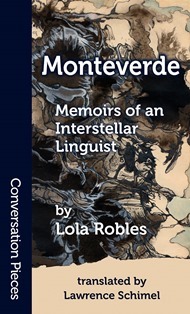Sue Burke's Blog, page 53
January 11, 2017
Isabel and Fernando dixit
It's not often I get to translate a medieval royal decree. It was for an auction company, Nate D. Sanders, so potential purchasers could know what they were getting. For $5,000, the decree could be yours.

http://natedsanders.com/LotDetail.aspx?inventoryid=45639
-- Sue Burke

http://natedsanders.com/LotDetail.aspx?inventoryid=45639
-- Sue Burke
Published on January 11, 2017 06:41
January 10, 2017
My publications in 2016
A lot of what I published last year were works I translated from Spanish, and if you’re thinking about award nominations, I’d be just as proud to see my translations win an award as if they were my own works. So here are translations with my fingerprints on them:

Castles in Spain
An anthology of the stories by Spain’s top authors that changed the direction of its speculative fiction. I helped with the crowdfunding campaign, coordinated the translation team, and translated the steampunk novelette by Eduardo Vaquerizo, “Victim and Executioner.” Available at Sportula and Amazon .
The Twilight of the Normidons, by Sergio Llanes
A novel set in an alternate Europe. A Rome-like empire teeters after three thousand years of domination by the Sforza dynasty as rebellions threaten its borders and treason weakens it from within. Published by Dokusou Ediciones and available at Amazon.
“To Sleep, Perhaps to Dream”
A short story. A woman on a long walk home at night in North Korea meets her late husband. Published in the special Eurocon edition of SupersSonic magazine, available for free download here.
Spanish Women of Wonder
An anthology of eleven stories (seven are my translations) written in Spanish by women. With a foreword by Ann VanderMeer. Originally titled Alucinadas. Available from Palabaristas Publishing.
I published a little of my own fiction as well:
“The Perfect Place for Ghosts”
A short story set in Madrid, Spain. The city is full of chimaeras, ghosts, specters, shades, spirits, and other apparitions (this is allegedly true), and a neophyte ghost-hunter takes on his first case after a skyscraper burns down spectacularly (this happened for real, the Windsor Tower*). Published in SuperSonic magazine issue 5.
“They Sing in the Subways”
Another short story set in Madrid. When the lights go out, the subway becomes menacing. Published in Madness and Riddance: Madrid Writer's Club Anthology.
— Sue Burke
*Here’s a spectacular video of the Windsor Tower fire, but don’t listen to the sensationalist narration, which is riddled with inaccuracies, and as always do not under any circumstances read the comments, which will make you despair for humanity.

Castles in Spain
An anthology of the stories by Spain’s top authors that changed the direction of its speculative fiction. I helped with the crowdfunding campaign, coordinated the translation team, and translated the steampunk novelette by Eduardo Vaquerizo, “Victim and Executioner.” Available at Sportula and Amazon .
The Twilight of the Normidons, by Sergio Llanes
A novel set in an alternate Europe. A Rome-like empire teeters after three thousand years of domination by the Sforza dynasty as rebellions threaten its borders and treason weakens it from within. Published by Dokusou Ediciones and available at Amazon.
“To Sleep, Perhaps to Dream”
A short story. A woman on a long walk home at night in North Korea meets her late husband. Published in the special Eurocon edition of SupersSonic magazine, available for free download here.
Spanish Women of Wonder
An anthology of eleven stories (seven are my translations) written in Spanish by women. With a foreword by Ann VanderMeer. Originally titled Alucinadas. Available from Palabaristas Publishing.
I published a little of my own fiction as well:
“The Perfect Place for Ghosts”
A short story set in Madrid, Spain. The city is full of chimaeras, ghosts, specters, shades, spirits, and other apparitions (this is allegedly true), and a neophyte ghost-hunter takes on his first case after a skyscraper burns down spectacularly (this happened for real, the Windsor Tower*). Published in SuperSonic magazine issue 5.
“They Sing in the Subways”
Another short story set in Madrid. When the lights go out, the subway becomes menacing. Published in Madness and Riddance: Madrid Writer's Club Anthology.
— Sue Burke
*Here’s a spectacular video of the Windsor Tower fire, but don’t listen to the sensationalist narration, which is riddled with inaccuracies, and as always do not under any circumstances read the comments, which will make you despair for humanity.
Published on January 10, 2017 08:22
January 1, 2017
A few goals for the new year
For 2016, my big goal was to move back to the United States. Mission accomplished. In fact, I seem to have arrived in America’s hour of greatest need.
Now it’s 2017.

If all goes well, in May I’ll finish the translation of Amadis of Gaul. Since 2009, I’ve been translating this medieval novel of chivalry a chapter at a time as a blog. I’ve learned a lot about the Middle Ages, translation, and ways to kill knights in combat. The novel comes in four books. I’ve self-published Book I, and when the blog is wrapped up, I’ll work on getting out II, III, and IV.
I also need to prepare for the launch of my own novel, Semiosis, by Tor in a year from now. Books don’t sell themselves, after all, so let me try to sell it to you now:
Plants can see. Plants can count. Plants can communicate with each other... here on Earth. Imagine if they could think – and imagine how they would react on a distant planet to a new human colony. The colonists have named their new planet Pax in keeping with their high ideals. They face danger not only from their environment but from their own human failings, and they find allies in other life forms that share their aspirations. But the ecology has missing pieces. Some animals and plants have been domesticated, and someone built a beautiful city. Who did it, and where are they now?
If you like Semiosis, you might like the sequel, when Earthlings come looking for the colony, unaware of the contempt that colonists have for Earthlings. I want to finish writing the sequel in 2017 – and to start the third book in the trilogy: Pax life forms come to Earth, and they’re smart and aggressive.
Besides that fun, I need to continue other writing projects, such as some short stories – and of course to keep translating.
In the meantime, I hope to sink deeper roots into my new home, Chicago.
— Sue Burke
Now it’s 2017.

If all goes well, in May I’ll finish the translation of Amadis of Gaul. Since 2009, I’ve been translating this medieval novel of chivalry a chapter at a time as a blog. I’ve learned a lot about the Middle Ages, translation, and ways to kill knights in combat. The novel comes in four books. I’ve self-published Book I, and when the blog is wrapped up, I’ll work on getting out II, III, and IV.
I also need to prepare for the launch of my own novel, Semiosis, by Tor in a year from now. Books don’t sell themselves, after all, so let me try to sell it to you now:
Plants can see. Plants can count. Plants can communicate with each other... here on Earth. Imagine if they could think – and imagine how they would react on a distant planet to a new human colony. The colonists have named their new planet Pax in keeping with their high ideals. They face danger not only from their environment but from their own human failings, and they find allies in other life forms that share their aspirations. But the ecology has missing pieces. Some animals and plants have been domesticated, and someone built a beautiful city. Who did it, and where are they now?
If you like Semiosis, you might like the sequel, when Earthlings come looking for the colony, unaware of the contempt that colonists have for Earthlings. I want to finish writing the sequel in 2017 – and to start the third book in the trilogy: Pax life forms come to Earth, and they’re smart and aggressive.
Besides that fun, I need to continue other writing projects, such as some short stories – and of course to keep translating.
In the meantime, I hope to sink deeper roots into my new home, Chicago.
— Sue Burke
Published on January 01, 2017 12:12
December 30, 2016
Spanish word of the year: populismo
Spain’s Fundación del Español Urgente, Fundéu, which deals with language issues and the media, today selected its word of the year for 2016: populismo, or “populism.”
It tries to pick words important to current events and that have linguistic interest.
“Clearly, in a year as political as this one, with globally important events like the Brexit, Donald Trump’s electoral win, and the various elections and referenda in the Americas and Spain, Fundéu’s word of the year would have to come from that realm,” says Javier Lascuráin, the foundation’s coordinator general.
The word also has linguistic interest because its meaning has changed. At one time its use was neutral, related to “popular” or “of the people,” especially in contrast with elites or with shifting power from elites to the common people. Lascuráin says the meaning in Spanish has been moving toward more negative connotations.
Now, he says, “it’s often applied to policies of all ideologies, but they have in common the appeal to citizens’ emotions and the offer of simple solutions to complex problems.”
Runner-up words of the year included abstenciocracia, “abstention from voting by the majority”; posverdad, “post-truth”; youtubero, “YouTuber”; ningufonear, “phubbing”; and vendehumos “someone who sells something they don’t have (sell smoke).”
Meanwhile, in English, Oxford Dictionaries went with post-truth. Cambridge Dictionary said paranoid sparked the most online searches. Dictionary.com cited xenophobia. Merriam Webster said “surreal” was looked up often, especially after tragic or surprising events, although fascism also sparked a lot of lookups.
Here in Chicago, according to Merriam Webster, in addition to the words of national interest, people were looking up irregardless after it was used by commentators about the World Series between the Cubs and Cleveland Indians. We also frequently looked up mature, hypocrisy, ignore, arrogant, clubbable, establishment, definition, common sense, and legacy.
Perhaps Chicagoans were only checking the spelling.
— Sue Burke
It tries to pick words important to current events and that have linguistic interest.
“Clearly, in a year as political as this one, with globally important events like the Brexit, Donald Trump’s electoral win, and the various elections and referenda in the Americas and Spain, Fundéu’s word of the year would have to come from that realm,” says Javier Lascuráin, the foundation’s coordinator general.
The word also has linguistic interest because its meaning has changed. At one time its use was neutral, related to “popular” or “of the people,” especially in contrast with elites or with shifting power from elites to the common people. Lascuráin says the meaning in Spanish has been moving toward more negative connotations.
Now, he says, “it’s often applied to policies of all ideologies, but they have in common the appeal to citizens’ emotions and the offer of simple solutions to complex problems.”
Runner-up words of the year included abstenciocracia, “abstention from voting by the majority”; posverdad, “post-truth”; youtubero, “YouTuber”; ningufonear, “phubbing”; and vendehumos “someone who sells something they don’t have (sell smoke).”
Meanwhile, in English, Oxford Dictionaries went with post-truth. Cambridge Dictionary said paranoid sparked the most online searches. Dictionary.com cited xenophobia. Merriam Webster said “surreal” was looked up often, especially after tragic or surprising events, although fascism also sparked a lot of lookups.
Here in Chicago, according to Merriam Webster, in addition to the words of national interest, people were looking up irregardless after it was used by commentators about the World Series between the Cubs and Cleveland Indians. We also frequently looked up mature, hypocrisy, ignore, arrogant, clubbable, establishment, definition, common sense, and legacy.
Perhaps Chicagoans were only checking the spelling.
— Sue Burke
Published on December 30, 2016 12:00
December 29, 2016
Download "SuperSonic" for free!
You can download the special English-language Eurocon edition of SuperSonic magazine. Learn all about Spanish science fiction and fantasy and read work by top authors. For free!
https://lektu.com/l/supersonic-magazine/supersonic-eurocon-2016/6604

https://lektu.com/l/supersonic-magazine/supersonic-eurocon-2016/6604

Published on December 29, 2016 06:39
December 14, 2016
More space aliens and linguists!
If you liked the movie Arrival, here’s another story about talking to aliens, Monteverde: Memoirs of an Interstellar Linguist, by Lola Robles, a Spanish author, translated by Lawrence Schimel.

Lola writes outstanding, thoughtful works, and Lawrence is a talented and sensitive translator. Full disclosure: they're also friends.
The cover blurb:
“Terran scholar Rachel Monteverde journeys to Aanuk, a paradisiacal planet famous for both its beaches and the generosity of its nomadic inhabitants. The Aanukiens are not the only people on the planet, however: Rachel is eager to meet the Fihdia, a cave-dwelling people who share a congenital condition that makes them blind. Rachel's relentless determination to communicate with them despite the Aanukien's dismissal and the Fihdia's secretiveness will yield more than she ever hoped for.”
Get it from the publisher (it’s cheaper):
http://www.aqueductpress.com/books/978-1-61976-117-9.php
Get it at Amazon:
https://www.amazon.com/Monteverde-Memoirs-Interstellar-Linguist-Conversation-ebook/dp/B01N577WGL/ for Kindle
https://www.amazon.com/Monteverde-Memoirs-Interstellar-Linguist-Conversation/dp/1619761173/ in paperback
— Sue Burke

Lola writes outstanding, thoughtful works, and Lawrence is a talented and sensitive translator. Full disclosure: they're also friends.
The cover blurb:
“Terran scholar Rachel Monteverde journeys to Aanuk, a paradisiacal planet famous for both its beaches and the generosity of its nomadic inhabitants. The Aanukiens are not the only people on the planet, however: Rachel is eager to meet the Fihdia, a cave-dwelling people who share a congenital condition that makes them blind. Rachel's relentless determination to communicate with them despite the Aanukien's dismissal and the Fihdia's secretiveness will yield more than she ever hoped for.”
Get it from the publisher (it’s cheaper):
http://www.aqueductpress.com/books/978-1-61976-117-9.php
Get it at Amazon:
https://www.amazon.com/Monteverde-Memoirs-Interstellar-Linguist-Conversation-ebook/dp/B01N577WGL/ for Kindle
https://www.amazon.com/Monteverde-Memoirs-Interstellar-Linguist-Conversation/dp/1619761173/ in paperback
— Sue Burke
Published on December 14, 2016 07:53
December 7, 2016
How do you say “crib” in Spanish?
What’s the word for “crib” in Spanish?

Here in Chicago, water cribs bring drinking water from Lake Michigan to the city. The first one was constructed almost 150 years ago two miles out in the lake, far from urban pollution, an engineering feat in its time.
But if you ask the average bilingual person about crib in Spanish without any context, they’d say “cuna.” I’d say “cuna.” It’s the most common meaning. But context is everything. Cuna doesn’t feel right in this instance. So let me check.
If I open up the Oxford Spanish Dictionary, an excellent bilingual source, and look up crib, I get cuna for “children’s bed”; or belén for “nativity scene”; or chuleta for “cheat sheet for an exam.” None of these seems right. I’ve never heard or read those words used to refer to an industrial-sized construction.
So let’s look at the meaning of crib in English in the American Heritage Dictionary. One of the meanings is “5. A framework to support or strengthen a mine or shaft.” If you think about it, a crib (for children) is a framework around a bed so babies don’t fall out. This might be the real term we want to translate: framework.
But if I look up framework in the Oxford Spanish Dictionary, I get “marco,” which is a frame around a picture, window or doorway, or a regulatory framework. Again, that doesn’t seem exactly right, although it’s closer....
Maybe I should call up Chicago Water Management to see if they have a Spanish-language term. This is a multi-lingual city, after all, and the utility would be the authoritative source. Or maybe I could contact a Spanish-language news outlet to see if they’ve already wrestled with the question.
This is why a translation can sometimes take a lot longer than you might expect. Words that look simple hide linguistic landmines. And sometimes accuracy reaches life-or-death urgency, such as the translation of a medical record for someone critically ill, or the instructions for operating a nuclear power plant. This is why translators specialize. They build up their vocabularies.
In any case, how does Chicago’s water taste? Fine. And unlike some locales, Chicago has a virtually never-ending supply coming in through those cribs.
— Sue Burke
Also posted at my professional writing website:

Here in Chicago, water cribs bring drinking water from Lake Michigan to the city. The first one was constructed almost 150 years ago two miles out in the lake, far from urban pollution, an engineering feat in its time.
But if you ask the average bilingual person about crib in Spanish without any context, they’d say “cuna.” I’d say “cuna.” It’s the most common meaning. But context is everything. Cuna doesn’t feel right in this instance. So let me check.
If I open up the Oxford Spanish Dictionary, an excellent bilingual source, and look up crib, I get cuna for “children’s bed”; or belén for “nativity scene”; or chuleta for “cheat sheet for an exam.” None of these seems right. I’ve never heard or read those words used to refer to an industrial-sized construction.
So let’s look at the meaning of crib in English in the American Heritage Dictionary. One of the meanings is “5. A framework to support or strengthen a mine or shaft.” If you think about it, a crib (for children) is a framework around a bed so babies don’t fall out. This might be the real term we want to translate: framework.
But if I look up framework in the Oxford Spanish Dictionary, I get “marco,” which is a frame around a picture, window or doorway, or a regulatory framework. Again, that doesn’t seem exactly right, although it’s closer....
Maybe I should call up Chicago Water Management to see if they have a Spanish-language term. This is a multi-lingual city, after all, and the utility would be the authoritative source. Or maybe I could contact a Spanish-language news outlet to see if they’ve already wrestled with the question.
This is why a translation can sometimes take a lot longer than you might expect. Words that look simple hide linguistic landmines. And sometimes accuracy reaches life-or-death urgency, such as the translation of a medical record for someone critically ill, or the instructions for operating a nuclear power plant. This is why translators specialize. They build up their vocabularies.
In any case, how does Chicago’s water taste? Fine. And unlike some locales, Chicago has a virtually never-ending supply coming in through those cribs.
— Sue Burke
Also posted at my professional writing website:
Published on December 07, 2016 08:46
November 23, 2016
At the Guadalajara International Book Fair
If you happen to be in Guadalajara, Mexico, this weekend, I’ll be at the International Book Fair. Specifically, I’ll speak about crowdfunding for translators Sunday, November 27, from 16:40 to 17:10 in Salón E, Área Internacional, at the Guadalajara Expo. This is part of the annual St. Jerome International Translation and Interpretation Conference.
Here’s an executive summary of my presentation, if you can’t be there.
A successful fundraising campaign needs:
• an attractive project,
• the right platform (like Kickstarter, Indiegogo, etc.),
• a team with a variety of skills,
• a list of possible contributors, and
• a plan that gets underway six months before the project starts accepting contributions.
An international, bilingual or multilingual project needs all that along with some unique requirements. For example, banking rules differ from country to country, and not every platform operates in every country. Shipping costs for sending rewards or perks overseas can be expensive. Cultures vary country about donating money.
In any case, a crowdfunding campaign is a lot of effort, but it can be a way to bring literature to new readers in other languages when traditional publishing might not be possible.
— Sue Burke
Here’s an executive summary of my presentation, if you can’t be there.
A successful fundraising campaign needs:
• an attractive project,
• the right platform (like Kickstarter, Indiegogo, etc.),
• a team with a variety of skills,
• a list of possible contributors, and
• a plan that gets underway six months before the project starts accepting contributions.
An international, bilingual or multilingual project needs all that along with some unique requirements. For example, banking rules differ from country to country, and not every platform operates in every country. Shipping costs for sending rewards or perks overseas can be expensive. Cultures vary country about donating money.
In any case, a crowdfunding campaign is a lot of effort, but it can be a way to bring literature to new readers in other languages when traditional publishing might not be possible.
— Sue Burke
Published on November 23, 2016 06:46
November 18, 2016
Off to a bad start
Like every writer I know, I’ve started too many stories that petered out and sit there on my hard drive tucked out of sight so they don’t depress me. These are mistakes – and I know why some of them happened. Here’s an analogy:
I’ve got a great starting idea for dinner today: I should use that lovely bag of baby spinach. But how? The possibilities leave me indecisive. I can’t start cooking until I have a goal in mind, a finished dish.
For that reason, menus list dishes rather than random, tasty ingredients. MasterChef uses the random ingredient challenge to torture its contestants because the odds are against them cooking up something delectable. It’s fun to watch them fail.
Yet writers commonly start stories “to see where they’ll go.” Stephen King champions this technique. I think his story “Obits,” nominated for the 2016 Hugo, shows how it can fail. In the story, a man discovers he has an extraordinary skill. And then ... he runs away and never does that thing again. The consequences of his skill, good or ill, are never explored. I suspect King didn’t know what to do with the idea. He didn’t win a Hugo this year.
By contrast, consider “Eutopia” by Poul Anderson in the 1967 Harlan Ellison anthology Dangerous Visions. In that story, a time traveler must flee for something horrible he did. We don't know what it was, but he seems like a good man. The very last word of the story tells you what happened (no spoilers), and its impact helped Dangerous Visions redefine science fiction. This was no accident. Anderson started the story knowing precisely how it would end – a great ending – and every word from the beginning pointed toward that end.
If I start a story or novel without knowing the ending, I might get blocked and, in panic, grab at the first ending that comes to mind, although it could be hackneyed or weak or miss the mark. Or I might not finish the story at all. If I start with a strong ending in mind, success is not guaranteed, but my odds are better.
I’ve learned that my ending idea need not be too specific: “He wins, although it means betraying some of his core values so he can uphold other values,” or “She kills her rival and takes over,” or “He lures the ghosts to a morgue and leaves them there, trapped.”
I still hope to achieve Anderson’s genius at endings – which means I have a goal (an ending) for the story of my writing career.
These days, if I’m working on a writing prompt, I try to write the ending of a story. I might draw on one of those half-baked ideas rattling around my brain, or I might come up with something new. I get a story I know how to finish. Much more needs to be done to flesh the idea out, of course, but the end is in sight.
Tonight, by the way, I’ll make a chicken-pasta-vegetable toss for dinner. The fresh baby spinach should be a delicious final touch. Bon appétit!
— Sue Burke
Also posted at my professional writing site:
I’ve got a great starting idea for dinner today: I should use that lovely bag of baby spinach. But how? The possibilities leave me indecisive. I can’t start cooking until I have a goal in mind, a finished dish.
For that reason, menus list dishes rather than random, tasty ingredients. MasterChef uses the random ingredient challenge to torture its contestants because the odds are against them cooking up something delectable. It’s fun to watch them fail.
Yet writers commonly start stories “to see where they’ll go.” Stephen King champions this technique. I think his story “Obits,” nominated for the 2016 Hugo, shows how it can fail. In the story, a man discovers he has an extraordinary skill. And then ... he runs away and never does that thing again. The consequences of his skill, good or ill, are never explored. I suspect King didn’t know what to do with the idea. He didn’t win a Hugo this year.
By contrast, consider “Eutopia” by Poul Anderson in the 1967 Harlan Ellison anthology Dangerous Visions. In that story, a time traveler must flee for something horrible he did. We don't know what it was, but he seems like a good man. The very last word of the story tells you what happened (no spoilers), and its impact helped Dangerous Visions redefine science fiction. This was no accident. Anderson started the story knowing precisely how it would end – a great ending – and every word from the beginning pointed toward that end.
If I start a story or novel without knowing the ending, I might get blocked and, in panic, grab at the first ending that comes to mind, although it could be hackneyed or weak or miss the mark. Or I might not finish the story at all. If I start with a strong ending in mind, success is not guaranteed, but my odds are better.
I’ve learned that my ending idea need not be too specific: “He wins, although it means betraying some of his core values so he can uphold other values,” or “She kills her rival and takes over,” or “He lures the ghosts to a morgue and leaves them there, trapped.”
I still hope to achieve Anderson’s genius at endings – which means I have a goal (an ending) for the story of my writing career.
These days, if I’m working on a writing prompt, I try to write the ending of a story. I might draw on one of those half-baked ideas rattling around my brain, or I might come up with something new. I get a story I know how to finish. Much more needs to be done to flesh the idea out, of course, but the end is in sight.
Tonight, by the way, I’ll make a chicken-pasta-vegetable toss for dinner. The fresh baby spinach should be a delicious final touch. Bon appétit!
— Sue Burke
Also posted at my professional writing site:
Published on November 18, 2016 07:55
November 10, 2016
What I’m doing at Windycon
I’ll be at Windycon 43 this weekend, November 11 to 13, in Lombard, Illinois. Here are the panels I’m on:
International SF&F - Friday 5:00 to 6:00 p.m. in room Lilac B
What are some of the current trends in SF outside of the English-speaking areas? Who are the exciting new authors in the rest of the world? And where do you look to find translations of their works?
Writing Unpleasant Characters - Friday 8:00 to 9:00 p.m. in room Lilac B
Even the worst villains need realistic motivation. How do you write a believable character that nobody likes?
Guard! Turn! Parry! Dodge! Spin! Thrust! - Saturday, 1:00 to 2:00 p.m. in Junior Ballroom A
What do you need to know if you want to write believable fight scenes?
Get Funded! - Saturday 4:00 to 5:00 p.m. in room Lilac D
Kickstarter, GoFundMe, and Patreon are just some of the ways to get funding for your creative project. Learn the pros and cons of crowdfunding.
— Sue Burke
International SF&F - Friday 5:00 to 6:00 p.m. in room Lilac B
What are some of the current trends in SF outside of the English-speaking areas? Who are the exciting new authors in the rest of the world? And where do you look to find translations of their works?
Writing Unpleasant Characters - Friday 8:00 to 9:00 p.m. in room Lilac B
Even the worst villains need realistic motivation. How do you write a believable character that nobody likes?
Guard! Turn! Parry! Dodge! Spin! Thrust! - Saturday, 1:00 to 2:00 p.m. in Junior Ballroom A
What do you need to know if you want to write believable fight scenes?
Get Funded! - Saturday 4:00 to 5:00 p.m. in room Lilac D
Kickstarter, GoFundMe, and Patreon are just some of the ways to get funding for your creative project. Learn the pros and cons of crowdfunding.
— Sue Burke
Published on November 10, 2016 08:57



